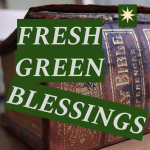
Psalm 34:4- 11: I sought the Lord, and he answered me, and delivered me from all my fears. Look to him, and be radiant; so your faces shall never be ashamed. This poor soul cried, and was heard by the Lord, and was saved from every trouble. The angel of the Lord encamps around those who fear him, and delivers them. O taste and see that the Lord is good; happy are those who take refuge in him. O fear the Lord, you his holy ones, for those who fear him have no want. The young lions suffer want and hunger, but those who seek the Lord lack no good thing. Come, O children, listen to me; I will teach you the fear of the Lord.
∞∞∞∞∞∞∞∞
Fear, fear, fear. Verse 4: Delivered me from all my fears. Verse 7: Those who fear him. Verse 9: O fear the Lord…Those who fear him. Verse 11: I will teach you the fear of the Lord.
Shouldn’t we be seeking a religion of love and compassion rather than one of fear? What possible value is there in a theology of fear? In a G-d to be feared? In teaching us fear?
These are worthy questions. Certainly, there is much in the Judeo-Christian Bible that does support a “theology of fear.” However, like many other Biblical passages, Psalm 34:4-11, even with its five references to fear in eight lines, need not be understood as simply promulgating a “theology of fear.”
At issue here is translation. Multiple Hebrew words are translated as “fear” in the Bible; where the original text offers many words with various and subtle meanings, the English text has been reduced to a single word, in this case: fear.
Compare the Hebrew word megurah in verse 4 of the psalm with yare and yirah in verses 7, 9, and 11. In verse 4, the Lord delivered me from all my megurah (fears). Megurah here is referencing “fear” that is terror related to evil. Now, let’s look at yare and yirah that are also translated as “fear” in this psalm from verses 7, 9, and 11. 7: The angel of the Lord encamps around those who yare (fear) him. 9: O yare (fear) the Lord, you his holy ones, for those who yare (fear) him have no want. 11: I will teach you the yirah (fear) of the Lord. Yare and yirah here are referencing a melding of awe, dread, wonder, fear, respect, and reverence. This is expressed by Rudolph Otto in his 1917 book The Idea of the Holy when he speaks of the Mysterium Tremendum, this awe-inspiring mystery that is simultaneously fascinating and terrifying, causing us to step back while also leading us to move towards.
As we compare the terror megurah that we are protected from in verse 4 of Psalm 34, with the awe/wonder/reverence yare/yirah that we are invited into in verses 7, 9, and 11, we see that the Hebrew writers are speaking of fundamentally different experiences – even contradictory experiences – but our English-language Bibles explain it all in one word: fear. Unfortunately, the complexity, differences, and nuance of megurah, yare, and yirah are all simply reduced to “fear” in our English translation of the Bible.
∞∞∞∞∞∞∞∞
Religion and theology should be focused on love and compassion, but this does not preclude entering into the sacred dance with wonder, dread, awe, fear, respect, and reverence that are expressed as yare and yirah. Our world is awe-inspiring and awe-ful. Watch a robin catch an earthworm and then feed it to her young. How amazing! There are, living amongst us on this planet, these illustrious, magical beings called worms. They are amazing, awe-inspiring creatures! And then birds – flying through the air! Building homes with sticks and bits of mud! What about the wonder of the baby robin coming out of the egg! And what about the awfulness and wonder that the flesh of the majestic worm will be torn to shreds in its terrifying death. Is not this the loving work of the mother bird? Through its pain and sacrifice will not that worm help the lovely young bird to grow so that it too can fly and sing? The Great Sacredness that may be called G-d encompasses the full yare-yirah of life on Earth. Where do you experience the wonder and dread of yare and yirah? Be thankful that the Bible offers stories of love and compassion. And be thankful that the Bible does not shy away from the fascinating, terrifying, awe-inspiring Mysterium Tremendum.
(Music: Courtesy of Adrian Von Ziegler, “Circle of Life.” )